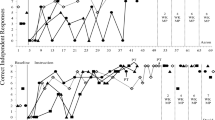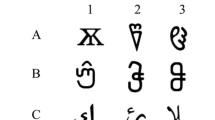Abstract
The effects of instructional accuracy on performance using a complex conditional discrimination procedure were studied in 23 humans. The task was to push 1 of the 9 number pads of the keyboard corresponding to 9 stimuli presented on a computer display randomly. In Phase 1, subjects were assigned to 1 of 3 groups with different instruction varying in degree of accuracy: accurate, partially accurate, and minimum instructions. All groups then were required to perform a conditional discrimination task without instruction in Phase 2. Both phases ended when subjects made correct responses on 18 successive trials, if subjects could not satisfy this criterion, the phase ended after 720 total trials. In Phase 1, all subjects accomplished the task within 270 trials. In Phase 2, subjects in the accurate and minimum instruction groups accomplished the task within 450 trials. However, the subjects in the partially accurate instruction group needed more trials than the other groups and 4 subjects did not complete task within 720 trials. The results indicate that the partially accurate instruction interfered with acquisition of an optimal responding under new contingencies, suggesting that performance depends upon not only current contingencies, but also the history of the subject.
Similar content being viewed by others
References
ADER, R., & TATUM, R. (1961). Free-operant avoidance conditioning in human subjects. Journal of the Experimental Analysis of Behavior, 4, 275–276.
BARON, A., & GALIZIO, M. (1983). Instructional control of human operant behavior. The Psychological Record, 33, 495–520.
BUSKIST, W. R., BENNETT, R. H., & MILLER, H. L., Jr. (1981). Effects of instructional constraints on human fixed-interval performance. Journal of the Experimental Analysis of Behavior, 35, 217–225.
CERUTTI, D. A. (1991). Discriminative versus reinforcing properties of schedules as determinants of schedule insensitivity in humans. The Psychological Record, 41, 51–67.
DEGRANDPRE, R. J., & BUSKIST, W. (1991). Effects of accuracy of instructions on human behavior: Correspondence with reinforcement contingencies matters. The Psychological Record, 41, 371–384.
GALIZIO, M. (1979). Contingency-shaped and rule-governed behavior: Instructional control of human loss avoidance. Journal of the Experimental Analysis of Behavior, 31, 53–70.
HAYES, S. C., BROWNSTEIN, A. J., HAAS, J. R., & GREENWAY, D. E. (1986). Instructions, multiple schedules, and extinction: Distinguishing rule-governed from schedule-controlled behavior. Journal of Applied Behavior Analysis, 46, 137–147.
HAYES, S. C., & WOLF, M. R. (1984). Cues, consequences and therapeutic talk: Effects of social context and coping statements on pain. Behavior Research and Therapy, 22, 385–392.
JOYCE, J. H., & CHASE, P. N. (1990). Effect of response variability on the sensitivity of rule-governed behavior. Journal of the Experimental Analysis of Behavior, 54, 251–262.
LEANDER, J. D., LIPPMAN, L. G., & MEYER, M. E. (1967). Fixed interval performance as related to subjects verbalization of the reinforcement contingency. The Psychological Record, 18, 469–474.
LIPPMAN, L. G., & MEYER, M. E. (1967). Fixed-interval performance as related to instructions and to the subjects verbalizations of contingency. Psychonomic Science, 8, 135–136.
LOWE, C. F. (1979). Determinants of human operant behavior. In M. D. ZEILER & P. HARZEM (Eds.), Advances in analysis of behavior: Vol. 1. Reinforcement and the organization of behavior (pp. 159–192). Chichester, England: Wiley.
LOWE, C. F. (1983). Radical behaviorism and human psychology. In G. C. L. DAVEY (Ed.), Animal models of human behavior (pp. 71–93). Chichester, England: Wiley.
LOWE, C. R., BEASTY, A., & BENTALL, R. P. (1983). The role of verbal behavior in human learning: Infant performance on fixed-interval schedules. Journal of the Experimental Analysis of Behavior, 39, 157–164.
MATTHEWS, B. A., CATANIA, A. C., & SHIMOFP, E. (1985). Effect of uninstructed verbal behavior on nonverbal responding: Contingency descriptions versus performance descriptions. Journal of the Experimental Analysis of Behavior, 43, 155–164.
SHIMOFF, E., CATANIA, A. C., & MATTHEWS, B. A. (1981). Uninstructed human responding: Responsivity of low-rate performance to schedule contingencies. Journal of the Experimental Analysis of Behavior, 36, 207–220.
SKINNER, B. F. (1969). Contingencies of reinforcement: A theoretical analysis. New York: Appleton-Century-Crofts.
WEINER, H. (1962). Some effects of response cost upon human operant behavior. Journal of the Experimental Analysis of Behavior, 5, 201–208.
WEINER, H. (1964). Conditioning history and human fixed-interval performance. Journal of the Experimental Analysis of Behavior, 7, 383–385.
WEINER, H. (1969). Controlling human fixed-interval performance. Journal of the Experimental Analysis of Behavior, 12, 349–373.
WEINER, H. (1970). Instructional control of human operant responding during extinction following fixed-ratio conditioning. Journal of the Experimental Analysis of Behavior, 13, 391–394.
Author information
Authors and Affiliations
Corresponding author
Additional information
Thanks are due to Dr. Koichi Ono for valuable advice and helpful suggestions and comments. I thank Dr. Bernard Weiss, Dr. Victor Laties, Dr. Sander Stern, Dr. Grazyna Zareba, Mr. Geoffrey Inglis, Dr. Yukihiro Hojo, and Mr. Gary Minsavage for commenting on this manuscript prior to its submission for review and publication.
Rights and permissions
About this article
Cite this article
Hojo, R. Effects of Instructional Accuracy on a Conditional Discrimination Task. Psychol Rec 52, 493–506 (2002). https://doi.org/10.1007/BF03395200
Published:
Issue Date:
DOI: https://doi.org/10.1007/BF03395200




